If you’re reading this blog, it’s probably for one of two reasons: you work on the engineering side and refer to the knowledge base for design solutions, or work on the maintenance and repair side where you refer to the knowledge base for troubleshooting guides and repair procedures.
This article will dive into the role of Knowledge Management in the automotive industry. We’ll first explore the challenges faced in the automotive sector, then demonstrate how knowledge management can address most of these challenges, and finally, discuss ways to enhance the effectiveness of knowledge management in the industry.
So, let’s jump right in.
Challenges in the Automobile Industry
Without a doubt, the car industry is significant. UK Automotive noted that it is vital to the economy, provides widespread employment, a considerable share in exports (about 10 percent), and has global impacts by producing a range of vehicle models.
Nevertheless, the industry has many challenges associated with growth, operation, and success, impacting efficiency and customer satisfaction. It demands to eliminate such obstacles to improve all these aspects.
Empowering Customer Independence (Utilizing Self-service)
We all agree on the fact that not all queries need a technician to handle them. Some issues can be resolved by customers themselves in the automotive industry through the use of self-service, such as troubleshooting guides or user manuals. The main challenge is making the resource accessible. Printed manuals are still in practice, but customers are looking for quicker help solutions like an online knowledge base where they can search and find answers effectively. Companies should educate their customers to handle the troubleshooting guides and use them promptly.
Other considerations include striking the right balance between self-service and traditional assistance and data safety issues.
Integrated Knowledge Repository
In the automobile industry, this challenge comprises an enormous set of data in the Integrated Knowledge Repository with technical specifications, repair guides, and troubleshooting details. The main objective of this centralized hub is to ease communication between service advisors, technicians, and customers.
For instance, a consumer comes up with a repeat occurrence that they want to address individually. Ideally, they would have access to a repository containing the model and would find either clear step-by-step instructions or videos. However, if the repository lacks information, requires updating, or is difficult to use, customers could experience frustration and require assistance from the outside.
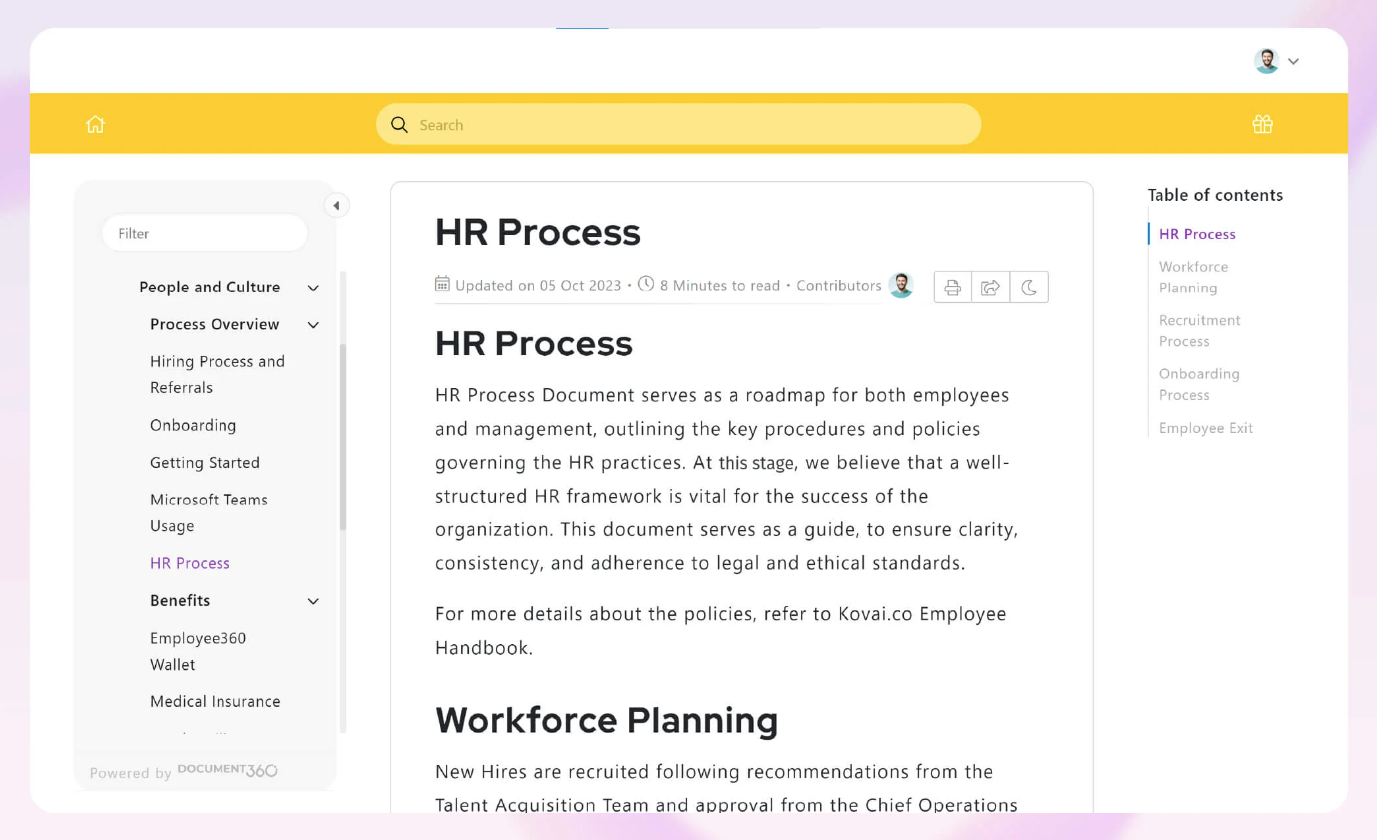
Centralized Data Storage Platform
It can be difficult for a team or department to coordinate their work concerning data management. Data handling becomes streamlined through centralized storage as diverse teams can exchange critical information seamlessly. The organization can facilitate the smooth flow of knowledge, resulting in improved operations.
Examples are designers producing car prototypes, engineers looking at operational data, and marketing departments focusing on consumer demands in the automobile sector. This comprehensive information is brought together in a centralized place by such a centralized platform, making design insights drive engineering designs and market approaches. It enhances teamwork, as information flows seamlessly among team members, making the sharing and exchanging of ideas accessible. This top-down approach maximizes effectiveness and makes valuable data easily accessible throughout the enterprise.
Agent Training Modules
The agents must always be trained and kept informed to remain skilled; hence, it is essential to make training modules for them. Maintaining personnel awareness of current developments and troubleshooting techniques is a continuing challenge. The workforce can respond to changing technology through short and precise training guides directly supporting customer demands.
For example, training modules in the automobile sector could involve enhanced diagnosis for maintenance, updated features on current vehicle versions, as well as how to better interact with customers. It is how agents become knowledgeable and ensure they offer quality services in an equally evolving industry.
Management of Call Center Tickets
Handling customer issues posted through call center tickets efficiently is inevitable. Streamlining processes and tools for controlling such tickets speeds up the work and increases customer satisfaction with response time.
For instance, suppose that a customer raises a complaint regarding the safety of their car equipped with an advanced safety feature, and they call the support center. In this case, a call center ticket would capture details of the problem. This ticket should be managed efficiently for streamlined processes and tools implemented. This way, the support team can quickly get hold of necessary specifics on the safety system, carry out the required steps towards troubleshooting, and give immediate help. It assists in solving the customer’s concerns and increases overall satisfaction, thereby showing the industry’s dedication to supporting and maintaining safety.
Must Read: What is Call Center Knowledge Base Software?
What is Knowledge Management?
Knowledge Management (KM) is a systematical and strategic method within an organization that entails collecting, sorting out, creating, and disseminating shared knowledge, accessing it, amending it, and analyzing it. It involves much more than data storage; it flows across employees, business partners, and customer bases. Knowledge management entails organizing and organizing organizational knowledge and using it for an effective goal-achievement process within the organization.
Similarly, KM ensures that when the need arises, one gets access to relevant information at any place and time. Provision of critical data on quick time assists plant engineers in curtailing the turnaround time taken in making decisions.
Good knowledge management involves planning how to create and communicate this information using proper tools to ensure everybody has equal access. The system goes beyond technology enabling information storage; it includes cultural and organizational aspects that create a supportive environment for continuous learning and innovations.
To succeed in the automotive industry, many distinct types of knowledge must collaborate. They are tacit knowledge, implicit knowledge, explicit knowledge, declarative knowledge, and procedural knowledge.
- The tacit knowledge of engineers’ and designers’ expertise affects the innovations made in car designs and drives.
- Collaborating across teams is more accessible when implicit knowledge is available that cuts through complexities while designing next-generation safety solutions.
- Standardized processes are achieved through explicit knowledge, such as manuals and guides in the manufacturing industry.
- Factual information in support of decisions regarding technical specifications is called declarative knowledge.
- Practical steps follow the procedural knowledge.
These different types of knowledge optimize vehicle design, manufacture, and troubleshooting, thus allowing the industry to remain dynamic while responding to ever-increasing customer expectations.
Why Does Knowledge Management Matter?
In the automobile industry, KM is essential for various reasons:
Smart Decision-Making
Have you ever thought about what makes car industry leaders choose wisely? It’s all about organized knowledge. Good KM enables sound decisions based on the correct information, whether selecting the best electric car technology or enhancing customer services.
Imagine the CEO of an auto company making a call on electric vehicle technology. Using a good KM informs them about various technologies, market trends, and how they impact production. It assists in their decision-making as they determine the latest tech suitable for their organization.
What about increasing customer satisfaction now? An intelligent leader relies on the KM system for winning customer service strategies and best practices. It provides for active customer service that is informed, thereby creating brand loyalty and building a good image.
An effective KM system is the hidden sauce for sound decision-making concerning technology and customer service strategies in the automotive sector. Cars are all about decisions and not about guesses.
Getting Things Done Faster
Knowledge of information within automobiles is shared among different departments, helping them execute their duties quicker and increase productivity. For instance, when manufacturing a new car, companies enjoy a shared knowledge base, which allows them to build on available designs, do things once, and access prior solutions. With this, designing cars becomes faster and easier.
Knowledge-sharing among the production team in the automobile sector makes product assembly better. If another team finds a superior method of joining components, they may communicate this information to other groups. It leads to faster cars and more of them overall.
One finds it helpful in customer support. Customer service people can look for information about a few of the usual problems and their solutions. It implies that they can serve their customers quickly and satisfy them. Everyone is running smoothly, sharing what is known. It makes it possible to achieve faster results since people will work better together and won’t be repeating themselves.
Teamwork Boost
Teamwork becomes excellent when a solid KM system supports it and breaks down the information silos. A culture that leads people to work together this way is common in complex industries such as manufacturing or automobiles.
For instance, if an electrical technical team manages to reduce the fuel required by cars, their competitors can use such information widely as soon as they become familiar with it. It is like a shared platform that they can easily access through a centralized knowledge system. It enables teams, for instance, those that develop and check it, to view and appreciate the solution. This information may help them enhance their efforts.
Designers can also use it as an additional solution to develop even more fuel-efficient parts, while quality control teams will ensure it works as expected. The knowledge system makes information available and promotes sharing, thus encouraging cooperation and ensuring the firm remains competitive in the motor industry.
Schedule a demo with one of our experts to take a deeper dive into Document360
Book A Demo
Benefits of Knowledge Management in the Automobile Industry
Why bother with Knowledge Management (KM) if it doesn’t bring benefits? Other compelling advantages are:
Reduction in Error Rate
The auto industry is quite different from all other industries we’ve covered. The new product development process in the auto industry requires not only brainstorming sessions by product and design engineers but also the participation of all staff at all levels, stakeholders, external partners (customers, suppliers, equipment manufacturers), and niche experts from other organizations.
A crowd like that only increases the complexity of developing a new product. Why? Error is one of the main issues. If care isn’t taken, information can get mishandled and lost in passing information to everyone.
This is where knowledge management comes in. KM can help transfer knowledge across the spread organization and preserve the knowledge asset despite the complexity.
Access Information Anytime
Due to the highly volatile nature of the automobile industry, this sector experiences a very high rate of employee turnover. Consequently, a significant amount of knowledge is lost when a company loses employees.
For instance, in the 1980s, Chrysler, an American car company, suffered from the loss of two important repositories: “The Chrysler Institute of Engineering” and “Technical Reports” which led to many problems for the company including a lack of teamwork and innovation, and inferior production quality.
To avoid going through what Chrysler went through, companies invest substantial resources in training new employees, only to face repeated turnover, information loss, and additional expenses for training replacements. The cycle continues.
Knowledge management provides a solution, preventing the loss of information due to employee departures. With a centralized repository and database, all information is stored, allowing anyone, including new employees, to access the necessary information anytime. This eliminates the need for auto companies to repeatedly spend on training new employees, enabling existing staff to make faster decisions with readily available information.
Reduce Task Multiplication
In the auto industry, most companies outsource most of their activities worldwide. This leads to one thing: an influx of information.
Knowledge management systems establish a centralized repository that stores information about outsourced projects, reports, best practices, etc. This repository becomes a valuable resource for employees, helping them access relevant information before starting new activities.
Avoid Long Holds and Call Queues
A robust knowledge base for customer service teams ensures swift issue resolution, eliminating the frustration of long hold times or navigating cumbersome call queues. A well-implemented knowledge management system empowers support representatives with quick access to comprehensive information, enabling prompt responses to common issues. This streamlined approach not only enhances customer experience but also boosts satisfaction.
By minimizing wait times and delivering accurate solutions, knowledge management reinforces a commitment to excellent service, positively impacting the automotive brand’s reputation. Overall, an effective knowledge management system contributes to a customer-centric approach, prioritizing responsiveness and elevating the quality of customer support in the automotive industry.
Faster Training and On-boarding
As we said previously, the auto industry is volatile and experiences a high employee turnover rate as companies are constantly downsizing or merging with other companies.
Without any knowledge management system (KMS) in place, companies will have to spend so many resources training new employees, and it could take months to get them in shape. With a KMS like Document360 in place, it’s easier to train employees and get them to adapt better and faster to the market needs.
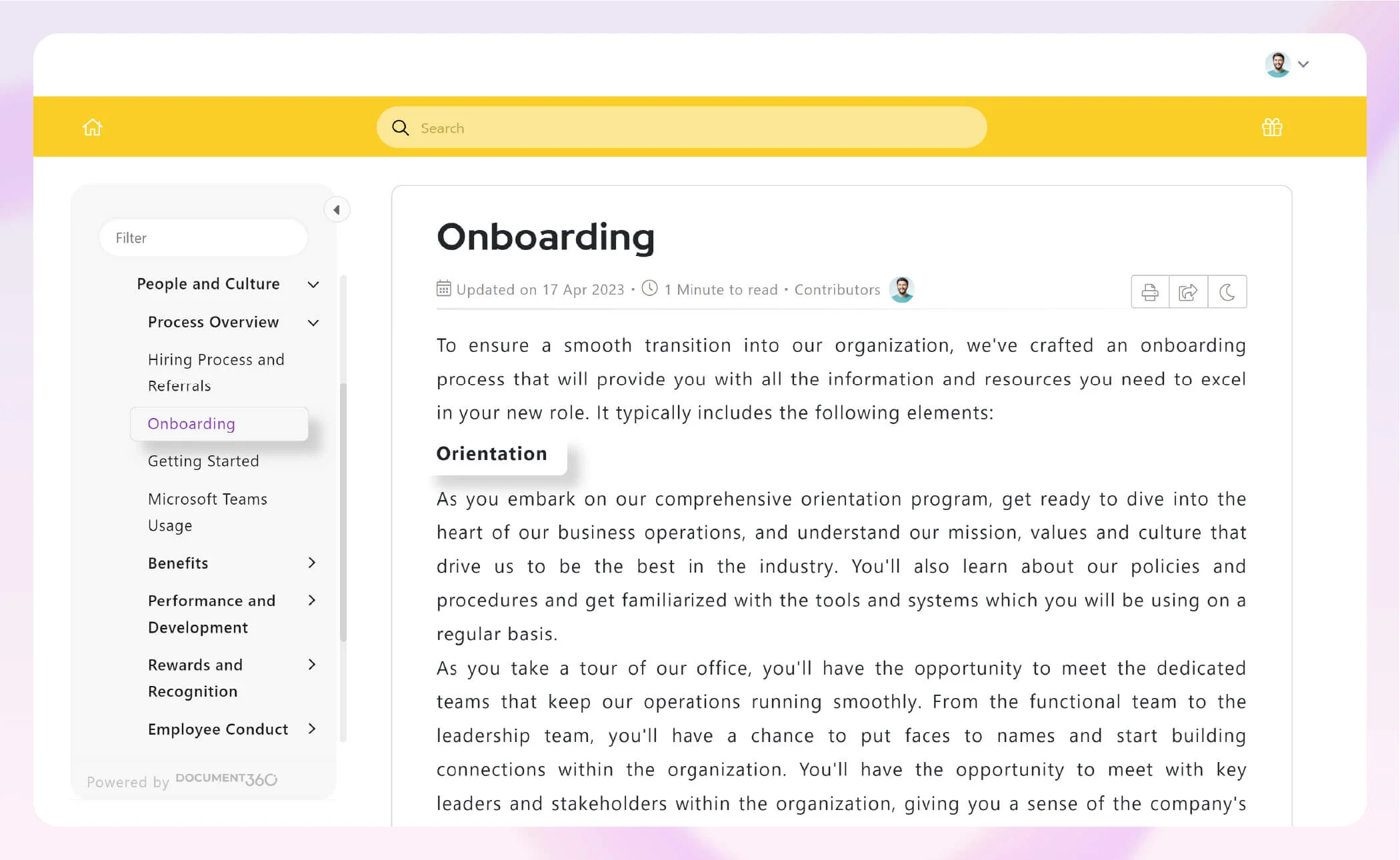
Increase Overall Brand Loyalty
Effective knowledge utilization positively impacts brand loyalty. Addressing customer concerns efficiently and consistently delivering high-quality products builds brand loyalty. KM plays a vital role by ensuring teams have the information needed to provide excellent service, create positive customer experiences, and foster devotion to the brand.
These benefits underscore the importance of adopting effective Knowledge Management practices in the automobile industry, driving efficiency, reducing errors, and enhancing overall organizational performance.
Also Read: AI in Knowledge Management
Making Knowledge Management More Effective in the Automobile Industry
Following the benefits, we understand the importance of Knowledge management as an integral part of the Automobile industry. Whether it be for the design team, customer handling team, R&D, or repairs and maintenance team, all need a central repository of information to access. Let’s see how to make it effective by implementing some successful strategies.
Continuous Content Update
Stale content doesn’t help. The new content needs to be updated on time to prevent errors. For this, in Document360, you can set up a reminder to notify us on time if you need to check and update an article.
User-friendly Interface
Simplicity matters in design and improves the adoption rate. Yes, the users should feel comfortable using the knowledge management portal, and easy use helps them use the portal often and harvest more benefits.
Personalized learning paths
The information in the knowledge management portal should be categorized based on the user’s needs and role. For example, having tailored content for a new employee helps him to successfully finish his learning using the article in the knowledge base. On the other hand, if you have learning paths designed to improve job performance, the employee can quickly follow the goal, enhancing the learning culture.
Feedback Mechanism
Gathering feedback from the users is paramount for success. The user’s feedback provides valuable insights into how the information is consumed. If you are creating an article in Document360, you don’t need to stress too much about this, as every article carries a feedback section where the users can share their feedback. This data is further interpreted with an analytics feature to understand users’ feedback clearly.
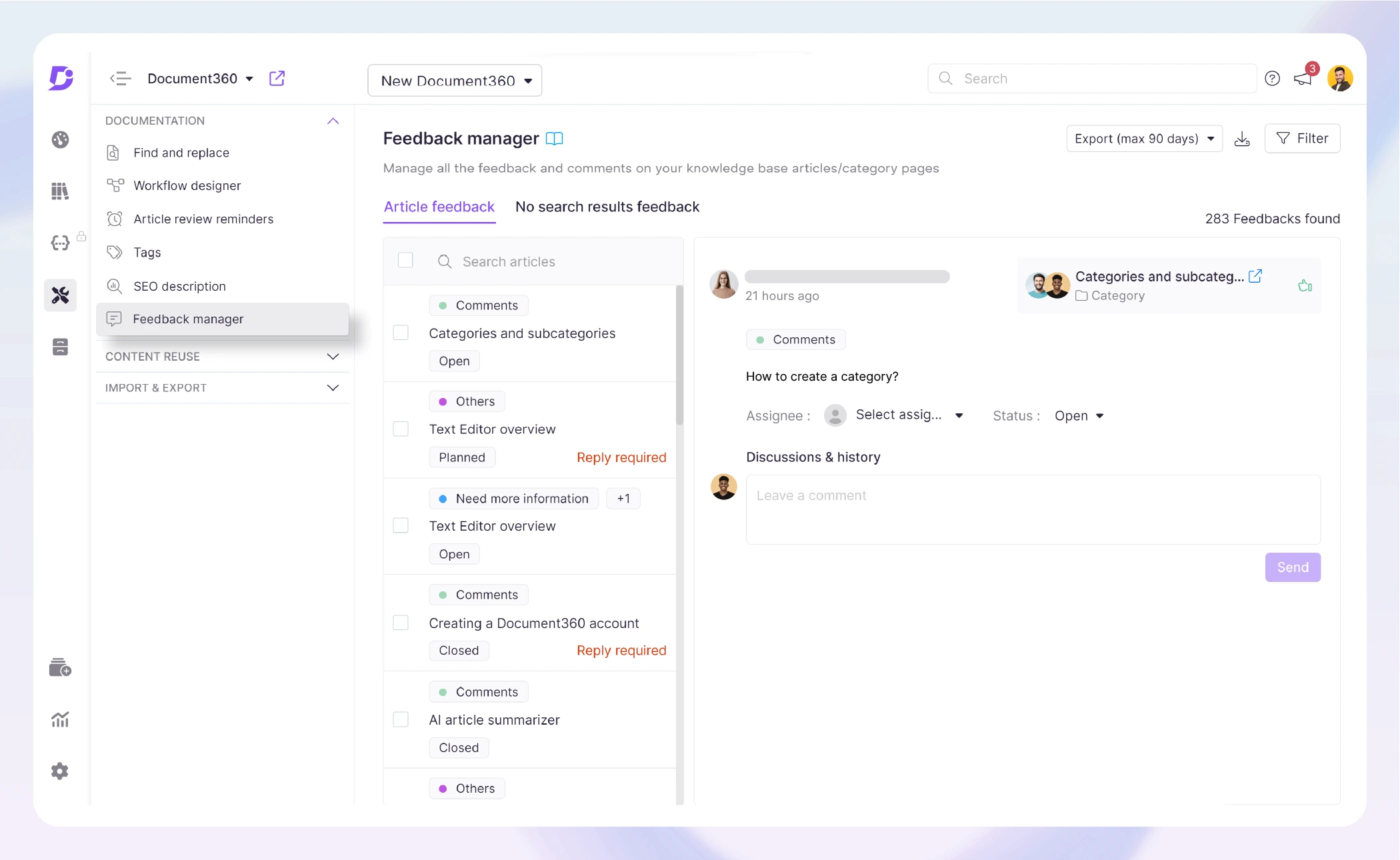
Integrate with Workflow
Making knowledge management an intrinsic component of daily activities ensures that knowledge is easily accessible when needed. The seamless integration with daily activities simplifies access to information, making it a crucial tool for decision-making and problem-solving inside the normal workflow.
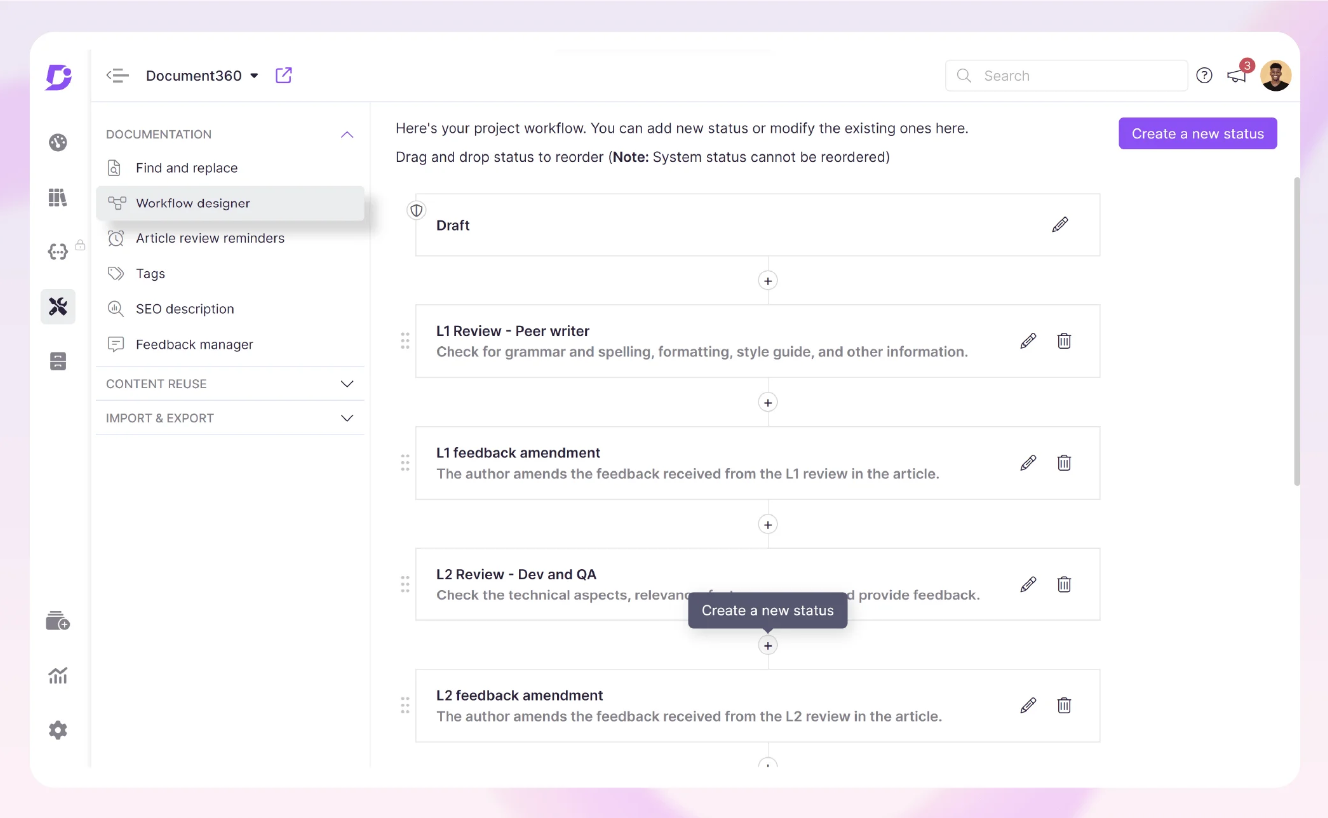
Automation and AI techniques
Using automation and AI techniques to simplify knowledge organization. AI integration improves the effectiveness of the knowledge management system by enabling content classification and intelligent search functions. It saves time while increasing the overall efficacy of knowledge management.
Collaborative Knowledge Creation
Encouraging teams to participate leads to a dynamic knowledge repository. Collaboration harnesses collective intellect, allowing different viewpoints to build the knowledge base. A collaborative approach fosters a culture of knowledge sharing and ongoing learning in the organization.
Also Read: Impact Of Documentation On The Release Management Process
Conclusion
Ultimately, it is very clear that Knowledge management is a key enabler in the Automobile industry. It supports sustainable growth, empowers employee knowledge, and fosters knowledge sharing and a collaborative ecosystem. As the automobile industry advances with new technologies, embracing knowledge management practices will undoubtedly contribute to business success.

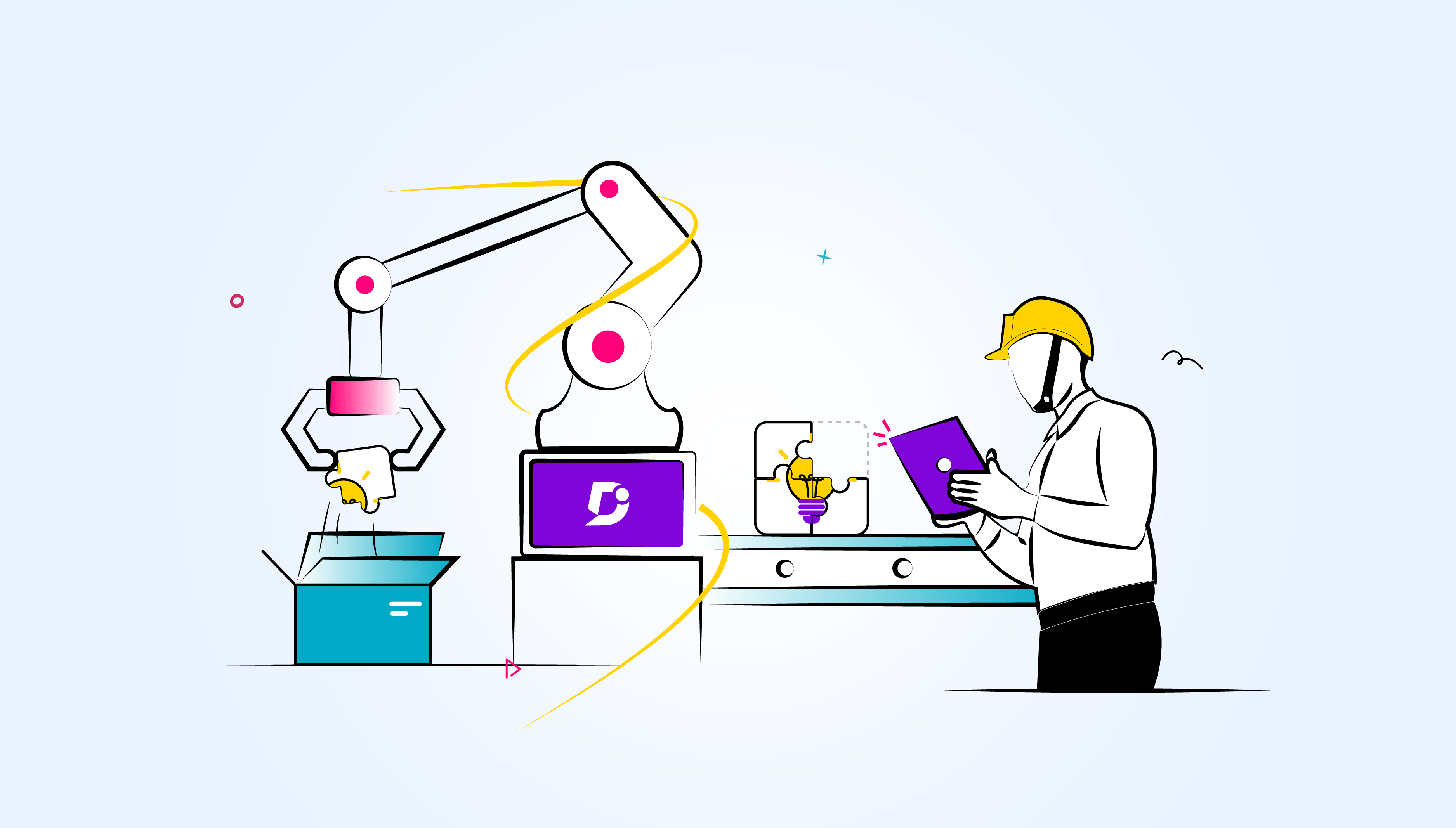


 –
– 

